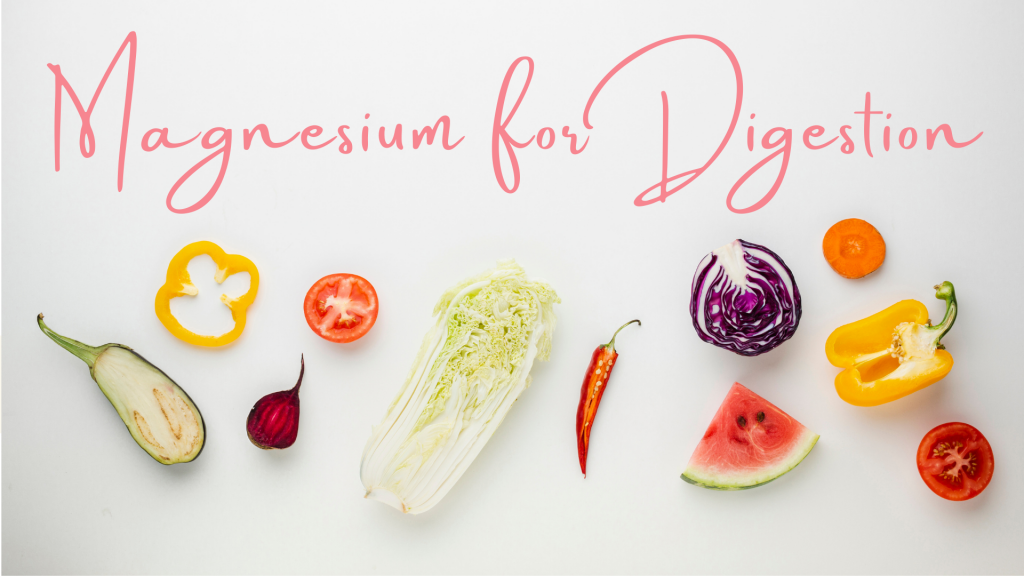
Why you should care about magnesium?
Magnesium can help with:
- Migraines
- Menstrual Cramps
- Constipation
- Regulating blood pressure
- Muscle spasms (eye twitching is a common a symptom of less than optimal magnesium)
- Bone development
- Sleep
It’s important to note that Magnesium is filtered through the kidneys, therefore individuals with kidney issues should not take magnesium supplements.
Magnesium for digestion:
Magnesium is a relaxant for muscles which can include your digestive tract. When the body is stressed the muscles contract. This is good, unless it is a chronic state that many find themselves in. When your digestive tract is contracted it might cause symptoms like diarrhea or constipation. Stress also diverts attention away from digestion. This is a protective measure, but when there is chronic stress it can cause digestive distress. Magnesium can help to balance this stress response. That means that individuals who find themselves chronically stressed may be using their magnesium more rapidly and need additional intake through food or supplements.
Some of the foods highest in magnesium are also foods that many people with IBS and other digestive symptoms avoid like leafy greens (raw veggies can be hard to digest), beans, and chocolate (often a reflux trigger).
Magnesium Supplements
- Magnesium citrate helps to pull extra water into the intestines which may help with constipation. However, magnesium citrate is poorly absorbed so it is not great at replenishing magnesium stores.
- Magnesium glycinate and malate are both good options for replenishing stores as they are among the best absorbed. These would be good for muscle cramps, menstrual cramps, relaxation, eye twitching and headaches.
- Magnesium threonate is well researched for it’s neurological benefits which may include depression and age-related memory loss.
- Other popular Magnesium supplements include oxide and hydroxide which are both poorly absorbed but then to be rather inexpensive. Hydroxide is best know as milk of magnesia. It is a laxative so it can be habit forming for your bowel and should only be used short term.

Food as Medicine
I am always going to suggest focusing first on the magnesium that you get in your diet before you experiment with supplementation. Getting enough Magnesium doesn’t have to be difficult or anything less than delicious. Mint chocolate chip smoothies are the perfect way to get a hefty dose of magnesium. It provides almost 200 mg of magnesium which is about half your daily needs! Blended ingredients are also easier to digestion for those with digestive issues. Brownie Batter hummus is another tasty option that provides about half of your daily magnesium needs per serving (about 1/4 of the recipe).
Brownie Batter Hummus
 Save Recipe
Print Recipe
Save Recipe
Print Recipe
Ingredients
- 1- 15 oz can chickpeas, drained and rinsed
- 1/3 cup cocoa powder
- 1/4 cup maple syrup
- 1/4 cup ground flaxseed
- 1 1/2 teaspoons vanilla
- 1/8 teaspoon salt
- 1 tablespoon coconut oil, melted
- 1/4 cup milk of choice
- 1/4 cup mini chocolate chips
Instructions
- Blend all the ingredients together except the milk and chocolate chips. Gradually add in the milk until desired texture is reached. Fold in chocolate chips. Serve with fruit or graham crackers.
7.8.1.2422https://www.kansascitydietitian.com/2022/03/magnesium-for-digestion/
 Save Recipe
Save RecipeIngredients
- 1- 15 oz can chickpeas, drained and rinsed
- 1/3 cup cocoa powder
- 1/4 cup maple syrup
- 1/4 cup ground flaxseed
- 1 1/2 teaspoons vanilla
- 1/8 teaspoon salt
- 1 tablespoon coconut oil, melted
- 1/4 cup milk of choice
- 1/4 cup mini chocolate chips
Instructions
- Blend all the ingredients together except the milk and chocolate chips. Gradually add in the milk until desired texture is reached. Fold in chocolate chips. Serve with fruit or graham crackers.
